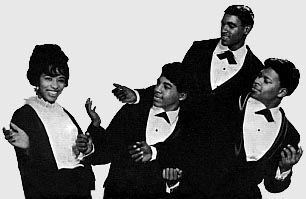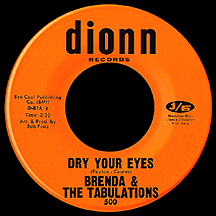BRENDA AND THE
TABULATIONS
Dry Your Eyes
Brenda Payton had a way with a song. She was aware there were opportunities in the city of Philadelphia, what with American Bandstand, Cameo-Parkway Records and various music-oriented entrepreneurs roaming the streets looking for talent. In 1965, not long out of high school, she joined a group called The Joyettes (a different act than the Alabama girl group that made a record for the Onyx label nearly a decade earlier), but they didn't stick together long. She veered away from her dreams, marrying James Rucker who, as it turned out, had euphonious leanings of his own. By 1966, Brenda was working a summer job at a playground in downtown Philly with Maurice Coates, a happy-go-lucky type with a tendency to sing while he worked...and the kids loved it. Maurice and Brenda often harmonized together for the children, right out in plain sight where passers-by would often stop and take notice.
Gilda Woods was married to popular Philadelphia deejay Georgie Woods ("The Man with the Goods!"), who hosted nighttime shows on both WDAS and WHAT, competing rhythm and blues stations, in '66. Through her high-profile husband she developed connections with a few of the city's record companies, particularly Jamie/Guyden, whose owner, Harry Lipsius, was open to ideas. As luck, and perfect timing, would have it, she was driving along Lehigh Avenue and passed the playground at 2nd Street, where she couldn't help noticing Maurice and Brenda doing their thing (besides, she was always on the lookout for singers with potential). Gilda stopped to talk, asked if they had any original material and agreed to meet them at Maurice's house a few days later to hear what they had. The pressure was on for the pair to actually to write something!
Suddenly songwriters, they came up "Dry Your Eyes" very quickly. As soon as they sang it for Gilda, she offered to manage them. With a promising new act, and song, Lipsius gave Woods the green light; the Dionn record label was born and a recording session was scheduled. Guitarist Eddie Jackson and Brenda's husband, James Rucker, were recruited. Gilda supplied a name for the quartet in random fashion: opening a dictionary, the first word that caught her eye was "tabulate." She liked the mathematical connotation (as in counting all that money they were going to make!) and the band, centering around young Payton as lead singer, became Brenda and the Tabulations.
One special thing about "Dry Your Eyes" had impressed Gilda: the song's deeply sentimental lyrics were quite unlike anything she'd heard, suggesting a custody situation of a parent with visitation rights, though the song could be intrepreted differently. Brenda's vocal performance verges on the heartbreaking: '...I am so sorry to see you cry...wipe those tears from your eyes, so long...mother's gotta go now...' Gilda brought in experienced Philly-based producer Bob Finiz to produce the session and he succeeded in drawing the emotion out of Brenda for the finished take. The song became a top ten R&B hit in the spring of 1967 while crossing over to mainstream top 40 stations and hitting top 20 pop. Flip side "The Wash" lightened the A side's anguished tone considerably; a mindless but infectious dance tune, it encouraged listeners to take the moves they make with the soap in the shower out onto the dance floor!

The group's near-instant success took them from that inner city Philly playground to the stage at New York's Apollo Theater inside of six months. Brenda and the guys spent most of 1967 on the road, opening shows for some of the hottest acts of the day. Coates had a year of high school remaining, but when opportunity comes calling, one must answer...he managed to continue his studies while touring and was able to graduate with his class. The second Dionn single became a two-sided hit: "Stay Together Young Lovers," written by Thom Bell and Lorriane Ellison (a dynamic soul singer in her own right), coupled with "Who's Lovin' You" from Smokey Robinson's backlog of brilliant creations. These early Tabulations tracks stood apart from the elaborate soul productions coming out of the big eastern cities at the time; the spare arrangements highlighted Brenda's passionate vocals nicely. Later that emphasis on Brenda as the group's central focus would not bode well for its male members.
Maurice and Brenda took their songwriting seriously, yet efforts like "Just Once in a Lifetime" bore perhaps too much resemblance to "Dry Your Eyes." Bob Finiz contributed "When You're Gone," which fared a little better on the charts, but a break was needed from what had become a barrage of ballads. The uptempo "Baby You're So Right For Me," written by Gary Klein and Jimmy Roach, did the trick but only hit the pop charts; R&B stations preferred the flip side, Finiz's "To the One I Love," a haunting ballad. Eight Tabulations 45s were released on Dionn between 1967 and '69, then for reasons of her own, Woods dissolved the label. Jamie/Guyden replaced it with a new imprint, Top and Bottom, and with that switch there were a number of shakeups. Rucker became harder to work with as his wife's public recognition was rising and the others, led by Coates, shut him out of the group. Bernard Murphy and drummer Jerry Jones came on board to replace him.
The first Top and Bottom single, "The Touch of You," written by Jones and Jackson, appeared in early 1970 and was the group's strongest seller since "Dry Your Eyes." Coates had patterned his songwriting style after Burt Bacharach and Hal David; he went straight to the source for Brenda's remake of "Don't Make Me Over," Dionne Warwick's breakthrough record from 1963. Gilda hired Van McCoy to produce and write songs for them; McCoy had an impressive track record with girl groups (The Shirelles, The Exciters) and female-led acts (Gladys Knight and the Pips, Ruby and the Romantics) and his input kept Brenda charting regularly for the next two years, but with one major change: the men weren't factored into future plans (though Maurice and Brenda continued writing songs together). Deborah Martin and Pat Mercer were added and the act became a female trio with a backing band. The hottest single during this time was "Right on the Tip of My Tongue," a McCoy-Joe Cobb composition that returned them to the R&B top ten and pop top 40 in the spring of 1971.
Brenda Payton remained a part of the music scene into the late 1970s, gradually adapting to the disco movement mid-decade under the constant guidance of Gilda Woods. McCoy composed and produced one minor hit for Epic in 1973, "One Girl Too Late." By 1976 Brenda was recording for Chocolate City (a subsidiary of Neil Bogart's Casablanca Records), still under the Brenda and the Tabulations name but with hired backing singers in the studio and onstage. She charted two singles on the Soul (formerly R&B) charts, including "(I'm A) Superstar" in '77. Brenda continued performing throughout the '80s, then passed away unexpectedly in 1992 at age 46. In the 21st century, her music is fondly remembered; that crazy B side of her biggest hit surfaced as an Axe Shower Gel commercial that demonstrated, at long last, how to do "The Wash."


